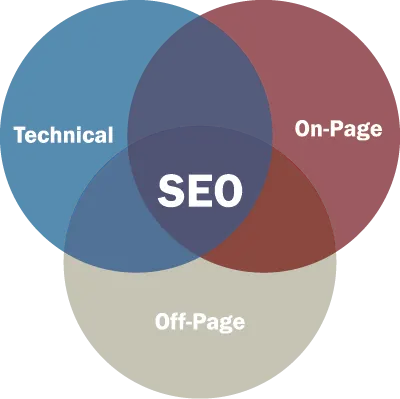The short answer is that poor technical SEO can cause your website to rank poorly on Google and it can even cause Google not to index your site at all. The same holds true for other search engines. But I assume that if you found this article you want to know a little more about why technical SEO is important.
But first …
What is Technical SEO?
I could use fancy jargon, but I won’t. The essence of technical SEO is to ensure that all the background techy stuff on your website improves rather than lowers how your web pages rank on search engines (e.g. looking good and being easy to read on mobile phones as well as computers).
SEO in general is one part of a digital marketing plan. More accurately, it is the most stable, long-term aspect of marketing your business in the digital world.
Sadly, a study by ahrefs found that just over 90% of websites get no traffic from Google at all.
SEO helps you get traffic to your website. Technical SEO is just one aspect of SEO. The other aspects are:
- On-Page SEO
- Off-Page SEO
On-page SEO involves having the right content and organising it in the best way. This is something you do for each of your webpages and you do it on the page itself. Hence the name.
Off-page SEO involves building links to your website from other websites. Search engines see quality links as votes of confidence in your webpage.
All three aspects of SEO are important and there is some overlap between them. But this article focuses on technical SEO.

5 Reasons Why Technical SEO is Important
The bedrock of SEO is having great content. But without technical SEO, search engines may not:
- Find your website quickly or at all
- Know about all the different pages on your website
- Understand what your site and its pages are about
- Store what it knows in its database (index)
- Rank pages as high as it could
Reason #1: Enable Google to Find Your Website
Google will not rank your site if it doesn’t know your site exists. Great web design and other SEO tactics will not matter if search engines don’t know about your site. How does Google know your site exists?
Search engines can find your site by accident (e.g., from a link to your site on a different website) but I wouldn’t leave this to chance.
The surest way is to connect your website to Google Analytics and Google Search Console (GSC). This is part of technical SEO.
Google Search Console (GSC)
GSC is an invaluable free tool offered by Google. It gives you important insights into your website and how it is performing.
You should also manually submit a sitemap of your site within GSC. But more on that in the next section.
Technical SEO helps search engines to find your website
Reason #2: You Want search engines to Know About All the Pages on Your Website
Search engines may know your website exists but not know anything about some of your site’s pages.
This is never a good thing, but it is even more damaging if search engines don’t know about a page that is critical to your business.
Sitemaps
The easiest way to solve the problem is to create an XML sitemap and then submit it to Google through GSC. An XML sitemap is simply a list of all the URLs for every page on your site. But it is written in a format that is for Google, not people.
You should also tell Google about any changes you make on a specific page. You can request page reindexing through GSC.
Duplicate Content Issues
There is another type of issue that may cause search engines to ignore some pages on your site – duplicate content. Duplicate content refers to the same content showing up on 2 or more URLs.
There are often technical reasons that cause duplicate content to appear, including posts and products being assigned more than one category. You can identify these duplicate content problems by performing a technical SEO audit. You can do a basic audit using GSC or using various paid tools online.
Once you have identified the duplicate content issues there are technical SEO solutions to fix them, including:
- Adjusting the site’s permalink structure
- Setting canonical URLs
In Short
In short:
- Sitemaps
- Informing search engines about changes to a page
- Fixing duplicate content problems
are all important aspects of technical SEO.
Technical SEO helps search engines know about each of your webpages
Reason #3: Helping Google Understand Your Website & Its Pages
Are you a local business? If so, Google would like you to add local business schema markup. Does your site have an online store? If so, Google would like you to add product schema to the products on your site.
Schema is simply background code that tells Google about your business, your site, and your offerings. And schema is just one-way technical SEO can help Google understand your website.
Google understands what your site (and each page) is about by reading the code behind it as well as the words you see.
Another simple technical SEO tweak is to include your key search term in the URL slug for that page on your site. The URL slug is the part of the URL after your domain name. For example, the URL slug for this page is /why-technical-SEO-is-important
A final technical tactic that helps Google understand each page of your website involves wrapping text in HTML tags. Most of the words on your webpages should be wrapped in paragraph tags
Example
<p>These words have been wrapped in paragraph tags</p>However, it is your page’s title that tells Google the focus of your webpage and it is your page’s subheadings that explain what is included. But the page title and subheadings only do this if wrapped in appropriate HTML tags.
Technical SEO helps search engines understand the focus of your webpages
Reason #4: Google May Choose Not to Store Your Site’s Details
So far, we have talked about how technical SEO can help Google find and understand all your webpages.
Yet, even if Googlebot does these two things, it may choose not to remember what it finds in its index. And, if Googlebot doesn’t store your details your site will not show up in Google’s search results.
There are technical reasons why Google may do this. Two of the most common ones are that your website is:
- Not mobile-friendly
- Slow and has poor web vitals
Mobile-Friendly Design
Today, most web designers create mobile-friendly websites due to Google’s decision to index mobile versions of your site first. Mobile-friendly or responsive web design is an industry standard. Yet, that doesn’t mean that all web designers follow this standard, especially those offering cheap websites. So mobile-friendly design is an absolute must.
If Google doesn’t like the mobile version of your website. It may not store (index) information about your site. But technical SEO professionals will check whether there are any issues and fix them if needed.
Googlebot may also decide not to index your website if it takes a long time to load or has issues with other web vitals. Web vitals are things Google considers important for people who search for things. Most of Google’s web vitals relate to specific aspects of speed. But one relates to parts of pages not jumping around while loading.
Technical SEO makes it more likely Googlebot will store (index) your site
Reason #5: It May Affect How Google Ranks Your Webpages
So now you know that technical SEO can help Google find, understand, and decide to store your site’s pages. If Google can’t or doesn’t do these things, your site will never show up in Google’s search results.
But even if Google can and does do these things, your site’s webpages may still not rank for search queries you want it to rank for on Google. This may be because of poor on-page SEO, poor off-page SEO or (you guessed it) poor technical SEO.
Why? Because search engine algorithms consider a search query that someone types against all the webpages that they know about. Then, they evaluate various factors to try and put the best ones higher in their search results.
One of the most important groups of factors relates to on-page SEO. Put another way, you need to have:
- Greate content
- Your content organised the best way
- The right words, in the right numbers included in your content
You also need to have relevant links from other sites pointing to your content. This is known as off-page SEO.
If Google knows about, understands, and stores your webpages. The only three reasons Google has for ranking your website lower are:
- Poor off-page SEO (number of quality links from other websites)
- Poor technical SEO
The aspects of technical SEO that are likely to need work are the same as those covered in Technical SEO Reasons 3 & 4. A web design that isn’t mobile-friendly will hurt your success in the digital world. A website that is slow to load will affect your digital success in the same way.
Technical SEO helps you rank well on search engines and succeed in the digital world.
Why the Technical Side of SEO Matters in a Nutshell
SEO is the bedrock of long-term success in the digital world. Technical SEO is one important aspect of SEO more generally.
Technical SEO affects how highly your webpages show up for relevant search queries that people enter into Google. There are aspects of technical SEO that directly affect your rankings.
But technical SEO also helps ensure that you have the right foundations in place by helping Google:
- Find your site and all its webpages
- Understand your site and all its webpages
- Decide to remember about your site and all its webpages

